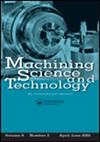不同激光加工参数下粉末床熔融增材制造Inconel 718合金的加工诱导表面完整性
IF 2.6
4区 工程技术
Q2 ENGINEERING, MANUFACTURING
引用次数: 5
摘要
摘要激光粉末床熔融(LPBF)工艺参数是影响增材制造(AM)技术制备的Inconel 718零件表面完整性和力学性能的关键因素。因此,AM社区通过试错法使用不同设置的各种参数来制造Inconel 718组件。这些增材制造的部件通常需要后处理或加工,包括精加工,以提高其表面性能。本研究系统地研究了体积能量密度、激光功率、层厚和扫描速度等LPBF加工参数对打印样品和表面完整性(即表面质量、孔隙率和显微硬度)的影响。此外,在恒定的加工参数下,使用加工操作,特别是对这些样品进行精加工,相应地评估打印条件对可加工性响应的影响,包括毛刺形成,切削力。此外,还研究了LPBF加工参数-加工表面和次表面之间的相互关系。研究表明,LPBF增材制造工艺参数对印出的Inconel 718试样有显著影响。结果还表明,激光功率、扫描速度和层厚等参数对增材制造的Inconel 718试样的可加工性、最终表面和亚表面性能都有影响。还应该指出的是,体积能量密度和增材制造的Inconel 718的可加工性之间存在着显著的关系。本文章由计算机程序翻译,如有差异,请以英文原文为准。
Machining-induced surface integrity of Inconel 718 alloy fabricated by powder bed fusion additive manufacturing under various laser processing parameters
Abstract Parameters used in laser powder bed fusion (LPBF) process are key factors that influence the surface integrity and thus mechanical properties of Inconel 718 components fabricated by additive manufacturing (AM) technique. For this reason, various parameters with different settings through trial and error approach have used by AM community to fabricate Inconel 718 components. These AM fabricated components generally required post treatment or processing including finish machining, to enhance their surface properties. This study presents a systematic investigation on the effect of volumetric energy density, and various LPBF processing parameters including laser power, layer thickness, and scanning speed on the as-printed specimens and the surface integrity aspects, namely surface quality, porosity, and microhardness. Furthermore, using machining operations specifically finish milling on these specimens under constant machining parameters, the effect of as-printed conditions on the machinability responses including burr formation, cutting forces are evaluated accordingly. Moreover, the interrelationship between LPBF processing parameters-machining-surface and subsurface aspects are also examined. This study reveals that LPBF additive manufacturing parameters have remarkable influence on the printed Inconel 718 specimens. Results also showed that parameters including laser power, scanning speed and layer thickness also have an effect on both the machinability and final surface and subsurface properties of the AM fabricated Inconel 718 specimens. It should be also noted that there is a notable relationship between volumetric energy density and the machinability of the AM printed Inconel 718.
求助全文
通过发布文献求助,成功后即可免费获取论文全文。
去求助
来源期刊

Machining Science and Technology
工程技术-材料科学:综合
CiteScore
5.70
自引率
3.70%
发文量
18
审稿时长
6 months
期刊介绍:
Machining Science and Technology publishes original scientific and technical papers and review articles on topics related to traditional and nontraditional machining processes performed on all materials—metals and advanced alloys, polymers, ceramics, composites, and biomaterials.
Topics covered include:
-machining performance of all materials, including lightweight materials-
coated and special cutting tools: design and machining performance evaluation-
predictive models for machining performance and optimization, including machining dynamics-
measurement and analysis of machined surfaces-
sustainable machining: dry, near-dry, or Minimum Quantity Lubrication (MQL) and cryogenic machining processes
precision and micro/nano machining-
design and implementation of in-process sensors for monitoring and control of machining performance-
surface integrity in machining processes, including detection and characterization of machining damage-
new and advanced abrasive machining processes: design and performance analysis-
cutting fluids and special coolants/lubricants-
nontraditional and hybrid machining processes, including EDM, ECM, laser and plasma-assisted machining, waterjet and abrasive waterjet machining
 求助内容:
求助内容: 应助结果提醒方式:
应助结果提醒方式:


